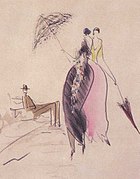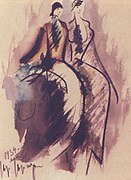Yury Yurkun
- Machine translation, like DeepL or Google Translate, is a useful starting point for translations, but translators must revise errors as necessary and confirm that the translation is accurate, rather than simply copy-pasting machine-translated text into the English Wikipedia.
- Do not translate text that appears unreliable or low-quality. If possible, verify the text with references provided in the foreign-language article.
- You must provide copyright attribution in the edit summary accompanying your translation by providing an interlanguage link to the source of your translation. A model attribution edit summary is
Content in this edit is translated from the existing Russian Wikipedia article at [[:ru:Юркун, Юрий Иванович]]; see its history for attribution. - You may also add the template
{{Translated|ru|Юркун, Юрий Иванович}}to the talk page. - For more guidance, see Wikipedia:Translation.

Yury Yurkun (born Juozas Jurkūnas;[1] September 17, 1895 – September 20, 1938) was a Lithuanian-born Russian writer and painter, and lover of poet Mikhail Kuzmin.
Early life

Yurkun was born in Lithuania on September 17, 1895, from a Catholic family. The original name is Juozas, written as Iosif (Иосиф) in Russian.
Personal life
Yuri Yurkun was the lover of poet Mikhail Kuzmin, who dedicated to him the cycle, "On the Journey" ("V doroge", dated February–August 1913). They met in Kiev in February 1913. Kuzmin wrote in his diary, on March 3, 1913: "I just cannot get my writing going; the closest possible friendship with Nagrodskaya (Yevdokiya Nagrodskaya) my love for Yurkun, my departure from the Sudeikins - that is all that has happened."[2]
Yurkun's profession in Kiev is unknown. He was possibly an actor working under the pseudonym "Mogandri". Others state he was a clerk in a bookstore. He went back to St. Petersburg with Kuzmin and they remained together until Kuzmin's death in 1936.[2]
While with Kuzmin, Yurkun also had a relationship with Nadezhda Zborovskaya-Auslender, an actress and wife of Kuzmin's nephew. The relationship with Kuzmin was not easy as the poet writes: "I love him very much, but his obstinacy and hooliganism will destroy him, no doubt about it" (Diary, May 27, 1913).[2]
In 1917 Yurkun was conscripted by the Bolsheviks, but deserted soon after. Yurkun and Kuzmin lived in St. Petersburg from 1918 to 1921. In 1918 Yurkun was arrested and detained for a brief period.[3]
In December 1920, Yurkun met his future wife, Olga Gildebrandt Arbenina, a young actress using the stage name of her father, Arbenin. The marriage legally never happened, but they considered themselves married. Yurkun, Arbenina and Kuzmin continued to live together with Yurkun's mother in the same communal apartment.[2]
In 1931 the secret police searched their apartment and confiscated Yurkun's manuscripts, forcing him to sign an agreement to cooperate. Two years after Kuzmin's death, in 1938, Yurkun was arrested and soon after executed in a massive political purge.[3]
Gallery
-
 Ladies with umbrellas (the scene in the Park)
Ladies with umbrellas (the scene in the Park) -
 Ladies in crinolines
Ladies in crinolines -
 Street scene
Street scene
References
- ^ ""Прошлый Век". Галерея искусства XX века. Живопись, фотография, графика, интерьеры, биографии художников XX века". pv-gallery.com. Retrieved 2020-01-08.
- ^ a b c d Nikolaĭ Alekseevich, Bogomolov; Malmstad, John E. (1999). Mikhail Kuzmin: A Life in Art. Harvard University Press. p. 227. ISBN 9780674530874. Retrieved 23 September 2017.
- ^ a b Aldrich, Robert; Wotherspoon, Garry (2001). Who's who in Gay and Lesbian History: From Antiquity to World War II, Volume 1. Psychology Press. p. 250. ISBN 9780415159821. Retrieved 23 September 2017.













